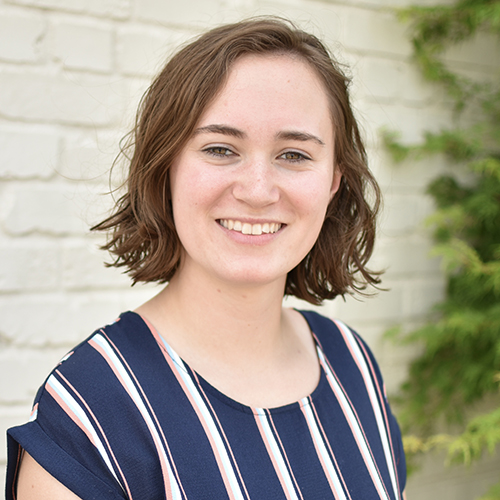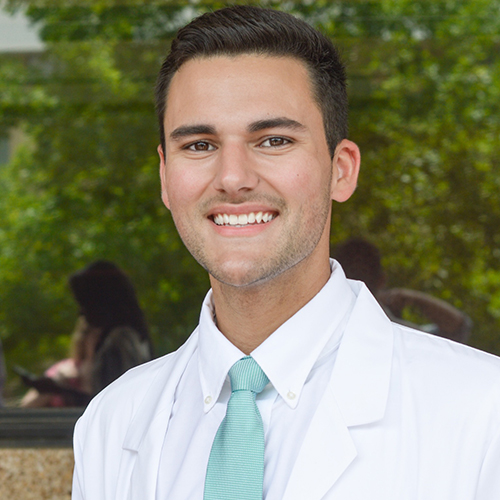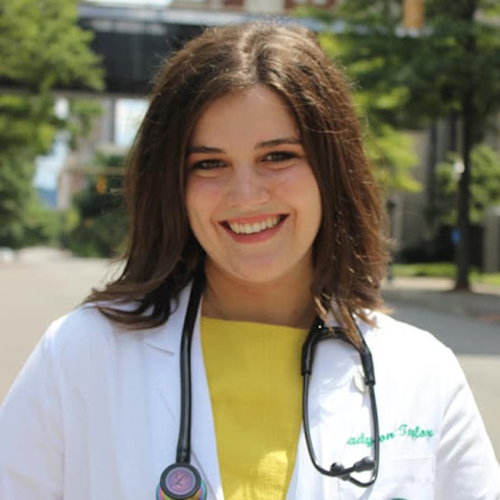Three medical students were selected for the Grants for Emerging Researchers/Clinicians Mentorship (GERM) Program for the year 2022-2023. Madison Jeziorski, Landon McNellage, and Madyson Taylor will each participate in the program, which directly supports medical students interested in careers related to Infectious Diseases (ID) or HIV. They will train one-on-one with Ellen Eaton, M.D., Olivia Van Gerwen, M.D., and Rachael Lee, M.D., respectively.
Funded by the Infectious Diseases Society of America (IDSA) Foundation—a community of over 12,000 physicians, scientists, and public health experts who specialize in infectious diseases, the GERM program offers clinical learning and/or research projects under the mentorship of an IDSA or HIVMA member for up to one year. Awardees are given an opportunity to take the role as a primary investigator on research projects.
A need for more ID specialists
The ISDA Foundation stated that in 2019, “nearly 80% of U.S. counties had no infectious diseases specialists, leaving too many jurisdictions ill-prepared for the COVID-19 pandemic.” Similarly, more than 1.2 million people were living with HIV in the U.S.
As the COVID-19 pandemic illustrated, the need for physicians, researchers, and health care professionals in these areas has continued to grow.
“We know that, even before the pandemic, there was an ID physician shortage, and COVID has broadened the gap,” said Ellen Eaton, M.D., associate professor in the Division of Infectious Diseases.
“So, there is a tremendous pressure to grow the pipeline of physicians and scientists to leave the field in good hands when our generation retires. I feel a sense of responsibility but also pride in training this generation,” said Eaton.
The GERM Program works to solve some of these challenges by attracting medical students early in their course work to ID and HIV medicine, exposing them to infectious diseases beyond the textbook, and sparking career interests.
Creating a pipeline for the next generation
Kristina Tymes-Wilbekin, an alumnus of the GERM Program, said the IDSA Foundation grant encouraged her exploration of infectious diseases in the context of reproductive and sexual health.
“The project I developed with mentorship from Dr. Jeanne Marrazzo during the GERM program, became the preliminary basis for my fellowship training grant that I was awarded in 2020.”
“Dr. Marrazzo has been my mentor throughout my Ph.D. training, and we used the GERM Program to structure our interactions and improve my productivity as a trainee. Working with her has been engaging and informative. The work we are currently doing is ever-changing and it is exciting to discuss new advances within the field,” she said.
Tymes-Wilbekin is a current medical student in the Medical Scientist Training Program and said her work with the GERM Program set up future scholarly interests in ID, creating a true pipeline. “It has been amazing to further develop the GERM project into my current dissertation work,” she said.
Similarly, Eaton explained the importance of ID and HIV medicine pipelines for young scientists and medical students: “When I was a student at UAB’s medical school, I fell in love with medical microbiology and virology, and worked with several ID attendings on the wards after my pre-clinical years,” said Eaton. “But, I never had an opportunity to shadow my attendings outside of the hospital wards, where the majority of their time is spent.”
“GERM allows students to develop research and mentored clinical experiences with a mentor so that they can really see what life is like as a practicing ID physician and scientist,” she explained.
“My mentees have been able to apply what they are learning in the classroom to clinical outcomes and health services research while learning principles of research, scientific writing, and research presentation skills. It's really a comprehensive experience.”
The Heersink communications team sat down with this year’s GERM Program awardees to learn more about their stories and future path in ID and HIV medicine.
 Madison JeziorskiMeet Madison Jeziorski, rising MS2
Madison JeziorskiMeet Madison Jeziorski, rising MS2
Q: How do the GERM Program and the IDSA Foundation contribute to key learnings and trainings in ID?
GERM is unique in that it emphasizes the mentor-mentee experience in order to provide a supportive and encouraging learning environment to foster interest in ID. Additionally, medical students are able to apply their own research ideas, which creates a space for diverse, unique, and relevant research in ID.
Q: What does this award mean to you?
With this grant, I am fortunate to be able to work with a truly amazing research team and learn from all of them. I am still deciding what I am interested in doing after medical school, but the GERM award allows me to couple ID research and my interest in health care for people experiencing homelessness. I am so excited to see where this research goes and how this experience ultimately influences my career.
Q: Why is it important to see more women in ID?
In reflecting on my own path to medical school, I have been assisted in my journey by so many women. Some were role models that challenged my perspective or the limits I was placing on myself. Some were people that took the time to bring me into an important discussion or nominate me for a position. All of these women gave me the confidence, experience, and examples of how to be a leader and follow my passions. Having women in ID will bring a new perspective to the field and allow so many more women the chance to learn and follow their interest in ID.
Q: Are you excited to train under your mentor?
Absolutely! Dr. Eaton has been so generous with her time and the opportunities she has given me already. I have learned so much about conducting, presenting, and writing in ID research from working with her. However, there is still so much I want to learn, and I am so excited to have more time to train with Dr. Eaton in a clinical and research setting.
 Landon McNellageMeet Landon McNellage, rising MS2
Landon McNellageMeet Landon McNellage, rising MS2
Q: How do the GERM Program and the IDSA Foundation contribute to key learnings and trainings in ID?
As the IDSA Foundation states, this program supports medical students in increasing analytical, research, and clinical skills that will impact their future trajectory.
I am extremely honored to be selected as a part of the 2022 GERM Program. I have been consistently supported by my mentor, Dr. Olivia Van Gerwen, and several of her colleagues including Dr. Eaton and Dr. Gravett. In addition to the support and education from my mentor and UAB’s own ID physicians, the GERM Program provides a complimentary IDSA/HIVMA membership. This membership grants access to IDSA’s publications, emails, and resources to stay informed on emerging issues and network in the fields of infectious diseases and HIV medicine.
Q: What does this award mean to you?
This award means having a passion for HIV medicine. This passion comes with learning about the shameful history of the HIV epidemic. It comes with hearing real stories from real people who deserve to know people in healthcare are fighting for them. It comes with combatting an ongoing stigma surrounding HIV-positive individuals. It comes with learning yet another way LGBTQ+ (specifically gay and bisexual) individuals are stereotyped. It comes with reliving the loss of one of my favorite college friendships to HIV. This award is an affirmation, in a sense, that my passion for this field of work is validated and needed. The GERM Program award means hope for families, friends, and individuals directly impacted by HIV and who long for supportive, non-stigmatizing healthcare.
Q: What is the grant term?
The grant term is for up to an entire year! Although we have already been working on our quality improvement project, this provides for continuation and exploration into papers or additional projects from our findings.
Q: Are you excited to train under your mentor?
I truly do not know how I got so lucky to be mentored by Dr. Van Gerwen. I know I’m going to continue to learn so much about this field of medicine and the quality improvement project process. Above all, I know I am going to be supported and encouraged. I know my mentor cares about my success as a future physician, not just success with this project alone. She balances a lot more than most people I know, yet she always makes time to listen, provide advice, and give feedback. I am eager to continue learning from such a compassionate and impactful mentor!
 Madyson TaylorMeet Madyson Taylor, rising MS2
Madyson TaylorMeet Madyson Taylor, rising MS2
Q: How do the GERM Program and the IDSA Foundation contribute to key learnings and trainings in ID?
The GERM Program was created to increase interest from medical students in ID or HIV medicine, with an emphasis on underrepresented populations within the field.
Q: What does this award mean to you?
When I discovered I had received the GERM Program grant, I was humbled to be selected among a diverse and intelligent collection of medical students from across the country. As a first-year medical student who decided late in my undergraduate career to pursue a career in medicine, I never believed I could receive recognition and funding from such a prestigious organization as the IDSA Foundation. This award has turned my focus from being concerned over my lack of experience to this opportunity to grow in my education, research skills, and patient care. It is an amazing honor to be able to represent the UAB Heersink School of Medicine and also serve as an example to other medical students that past experiences or lack of experience do not define one’s potential to serve in the advancement of medical research.
Q: Why is it important to see more women in ID?
These past few years have shown the nation how important Infectious Diseases is to patient care, hospital policy, and society as a whole. However, Infectious Diseases extends far beyond the scope of responding to a pandemic. The field is about education, community outreach, research, innovation, and quality care. In order to provide the best quality in all of these roles, the field needs a diverse group of physicians to bring a unique mindset to the table. Research from the National Institute of Health shows that women are affected disproportionately by many infectious and autoimmune diseases. Therefore, the experience of being a woman brings a unique perspective and passion to discover why women are affected by such conditions at higher rates as well as a desire to bring health education and curative treatments to women.
Q: Are you excited to train under your mentor?
There are few that can compare to Dr. Rachael Lee. Not only is she an amazing physician and leader within Infectious Diseases, but she is also a steadfast and committed mentor who is passionate about educating future doctors. To say I am excited to learn from such an impressive woman is an understatement. I cannot tell you how many of my classmates’ jaws have dropped when I tell them about my opportunity to learn under her. Dr. Lee’s work in UAB, Heersink School of Medicine, and Infectious Diseases is so impactful. I only hope I can try to embody a portion of the woman she is.
Learn more about the GERM Program or the IDSA Foundation, or check out more information about the Division of Infectious Diseases.